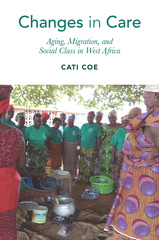
Laboring in the Shadow of Empire
Race, Gender, and Care Work in Portugal
Laboring in the Shadow of Empire: Race, Gender, and Care Work in Portugal examines the everyday lives of an African-descendant care service workforce that labors in an ostensibly “anti-racial” Europe and against the backdrop of the Portuguese colonial empire. While much of the literature on global care work has focused on Asian and Latine migrant care workers, there is comparatively less research that explicitly examines African care workers and their migration histories to Europe. Sociologist Celeste Vaughan Curington focuses on Portugal—a European setting with comparatively liberal policies around family settlement and naturalization for migrants. In this setting, rapid urbanization in the late twentieth century, along with a national push to reconcile work and family, has shaped the growth of paid home care and cleaning service industries. Many researchers focus on informal work settings, where immigrant rights are restricted and many workers are undocumented or without permanent residence status. Curington instead examines workers who have accessed citizenship or permanent residence status and also explores African women’s experiences laboring in care and service industries in the formal market, revealing how deeply colonial and intersectional logics of a racialized and international division of reproductive labor in Portugal render these women “hyper-invisible” and “hyper-visible” as “appropriate” workers in Lisbon.
Curington’s powerful and insightful analysis of Cabo Verdean women’s experiences in the global care migration in Portugal exposes the legacy of colonialism embedded in both structural conditions and daily interactions in a society that refuses to recognize or remedy its past, only to reproduce social domination and exploitation. Relegated to society’s 'dirty work' and racialized as Black across space, time, and national context, these women create spaces of belonging while laboring in the shadow of empire.’
Curington provides a much-needed intersectional analysis of Black Europe through this beautifully written ethnography of Cape Verdean women living and working in Portugal. Laboring in the Shadow of Empire refocuses our understanding of Portugal as a country of empire, colonialism, and immigration
Beneath and beyond the rigorous attention to the meaningful details of race and gender identity, language, and urban space, this ethnography has heart. Celeste Vaughan Curington shows us the experiences of Cape Verdean women, who rarely appear in sociological research, laboring and resisting racism in Lisbon. Laboring in the Shadow of Empire is a must-read for scholars of labor, colonialism, or domestic employment.’
By challenging the ideological harm of Portuguese anti-racialism, Celeste Curington places the language of gendered antiblackness, white supremacy, empire, and resistance firmly at the center of our contemporary understanding of race, space, and care work in Portugal. This is a much-needed book for all those who deny the existence of racism across Portugal and Europe.’
CELESTE VAUGHAN CURINGTON is an assistant professor of sociology at Boston University. She is the coauthor of The Dating Divide: Race and Desire in the Era of Online Romance.











